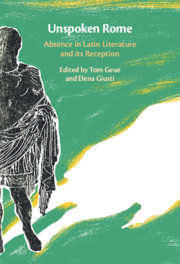Book contents
- Unspoken Rome
- Unspoken Rome
- Copyright page
- Contents
- Figures
- Unspoken Rome: Acknowledgements
- Contributors
- Introduction
- Part I Absence in Text
- Part II Absence in Context
- Part III Going Beyond
- Chapter 13 The Slave, Between Absence and Presence
- Chapter 14 In Search of the Lost City
- Chapter 15 Omnibus umbra locis adero
- Chapter 16 The Philology of Grief
- Chapter 17 Absence, Metaphysically Speaking
- Afterword Lights Out
- Bibliography
- General Index
- Index Locorum
Chapter 17 - Absence, Metaphysically Speaking
From Reception to Instauration?
from Part III - Going Beyond
Published online by Cambridge University Press: 03 September 2021
- Unspoken Rome
- Unspoken Rome
- Copyright page
- Contents
- Figures
- Unspoken Rome: Acknowledgements
- Contributors
- Introduction
- Part I Absence in Text
- Part II Absence in Context
- Part III Going Beyond
- Chapter 13 The Slave, Between Absence and Presence
- Chapter 14 In Search of the Lost City
- Chapter 15 Omnibus umbra locis adero
- Chapter 16 The Philology of Grief
- Chapter 17 Absence, Metaphysically Speaking
- Afterword Lights Out
- Bibliography
- General Index
- Index Locorum
Summary
This chapter revisits reception theory through an exploration of the metaphysics of presence and absence across time. Bringing together the ‘Letter to Horace’ of the Russian poet Joseph Brodsky and Horace’s own Epistles, it uses the theory of communication developed by John Durham Peters and the philosophy of the afterlife of Samuel Scheffler to elucidate the experience of, on the one hand, communicating with a past where one and so much of what makes one what one is was not present and, on the other, of projecting oneself into a future in which one will no longer exist so as to communicate with those who do not yet exist and whom one will never know. Recent metaphysical thinking has sought to make us sensitive to the existential incompleteness of people and things and the fragility of selves that are distributed across the multitude of ‘attachments’ which Bruno Latour suggests as one ‘mode of existence’ that makes us what we are. Latour suggests that we should not think of ourselves as simple, atomized, points of emission and reception for texts, and appeals to Étienne Souriau’s notion of instauration to suggest how our selves and what and whom we value are sustained.
Keywords
- Type
- Chapter
- Information
- Unspoken RomeAbsence in Latin Literature and its Reception, pp. 307 - 323Publisher: Cambridge University PressPrint publication year: 2021



